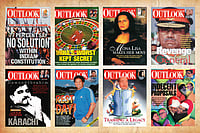But then De is nothing if not honest. Selective Memory is about "stories from her life". Too bad if trivia is all her professional life's ever been about. It's the life she lives, documents, "columns", fictionalises, celebrates, epitomises. This is De Profundis II by Lady Capote of the celluloid world: one who's nipped, carped, sleazed her way through her sorry writing life, built a dubious reputation on that puny plinth even as she accused her subjects/colleagues (who disown her categorically) of doing the same. De's given to frequent discourse on the Fifteen Minutes of Fame syndrome. She's stretched hers to all of 28 years. Best Sold Bad Taste. No mere goodlooker, wannabe writer but steely survivor, this. De will survive. Her prose? Debatable.
Unless, of course, she really does begin to write. You glean the beginning of writerly promise, flashes of sincerity, a real self, as when she writes feelingly of her relationship with her first husband, his wife, the mother-in-law, her two kids from the first marriage. Again, in her heartwarming account of how she bonded, sometimes failed, other times succeeded, with her two stepchildren from the second marriage. Of how she and husband Dilip cope with life in a marriage peopled uniquely with a Yours, Mine and Ours brood of six kids. Shobha's naive: "I don't always adore the people whose homes I visit. I do talk about them behind their backs." Shobha's astute: "Pretend to shun publicity and the media will chase you" like they chase that "John Wayne who can spell", viz V.S. Naipaul. Shobha's vulnerable: "furious" when she's knived in print or chopped up on live TV. Shobha's wounded, little-girl-lost wondering guiltily then whether "countless people" had not felt "the same way about something I had written". Shobha's real as when she talks of her mother's death, little sorrows, fleeting regrets, remembered happiness.
She touches your heart then. Because she's speaking from hers. And that ultimately remains the space from which our better selves, our enduring images, real writing emeges. In her writing, if not in her life so far, De's been too clever by half. All you see is evidence of a grass-hopping mind, soap sud intellect, silver foil soul. The foil drops off in these revealing bits: there's soul beneath the superficiality. De should learn from her own experience. Speak strongly, from the heart, like she tells us she once spoke to that literary Marathi audience in a Pune school. She won her audience. "Nobody booed. Everybody stayed." Speak on Shobha De. Strongly. Clearly. Not superficially, as is your wont. We promise not to boo. We might even stay.


























